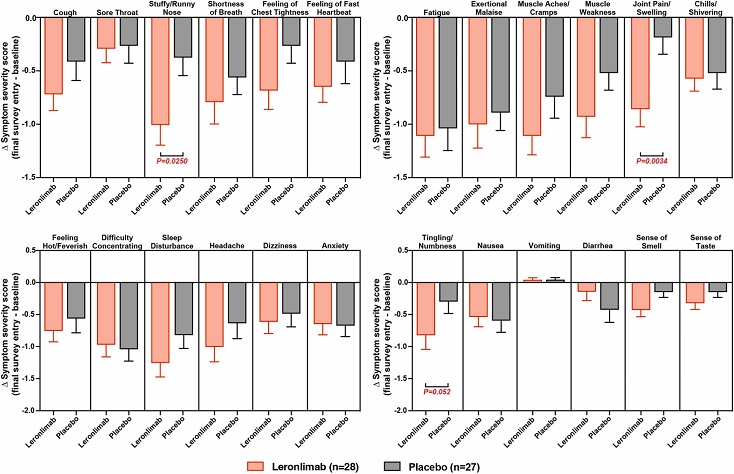American Researchers Claim That Immune Downmodulation Contributes To Long COVID And That Treatment With Leronlimab Helps
Nikhil Prasad Fact checked by:Thailand Medical News Team Mar 25, 2024 1 year, 3 weeks, 13 hours, 17 minutes ago
COVID-19 News: The ongoing COVID-19 pandemic has spurred a global scientific mobilization resulting in the rapid development of antiviral medications and vaccines. While these advancements have helped control the spread of the virus and treat acute infections, a significant number of individuals continue to experience post-acute sequelae of COVID-19 (PASC), commonly referred to as long COVID. This condition manifests as a diverse range of symptoms persisting beyond the acute phase of the illness, with some cases becoming chronic and severely debilitating.
 Immune Downmodulation Contributes To Long COVID And That Treatment With Leronlimab Helps. Change in symptom severity from baseline up to day 56 for subjects receiving leronlimab or placebo.
Prevalence and Impact of PASC
Immune Downmodulation Contributes To Long COVID And That Treatment With Leronlimab Helps. Change in symptom severity from baseline up to day 56 for subjects receiving leronlimab or placebo.
Prevalence and Impact of PASC
Studies conducted in 2022 estimated that around 6.9% of adults in the United States had experienced PASC, with a higher prevalence among women compared to men. Despite the introduction of antiviral treatments and vaccinations, PASC remains a substantial burden, with symptoms such as fatigue, cognitive impairment, and pain persisting for at least two years in some individuals.
Immune Dysregulation as a Key Factor
One significant challenge in addressing PASC is the limited understanding of its underlying pathophysiology. However, prevailing theories suggest that immune dysregulation plays a crucial role. To investigate this further, researchers from the Arthritis and Rheumatic Disease Specialties, Florida-USA and David Geffen School of Medicine at the University of California - Los Angeles-USA conducted an exploratory study that is covered in this
COVID-19 News report, involving 55 individuals with PASC who were randomly assigned to receive either leronlimab, an investigational CCR5-specific humanized IgG4 monoclonal antibody, or a placebo.
Findings from the Study
The study aimed to assess changes in symptom severity scores among participants receiving leronlimab versus placebo. Interestingly, while the trial was not statistically powered for direct treatment comparisons, there was a notable decrease in symptom severity scores among leronlimab-treated individuals compared to those receiving the placebo. Moreover, participants who responded positively to leronlimab treatment showed increased blood cell surface CCR5 levels, indicating a potential normalization of immune function.
Implications and Further Research Needs
These findings suggest that immune dysregulation, characterized by immune downmodulation prior to leronlimab treatment, may contribute to PASC. This sheds light on the proposed link between Epstein-Barr Virus (EBV) reactivation and PASC, indicating a broader pattern of immune system involvement. Additionally, emerging data on autonomic dysfunction in
PASC further supports the role of immune dysregulation in this condition.
Challenges in PASC Research
Despite promising findings regarding immunomodulators like leronlimab, there is a concerning lack of widespread effort in researching and developing effective treatments for PASC. Studies have highlighted a disparity in funding for PASC research compared to its disability burden, with female-dominant conditions often receiving less attention and resources.
Conclusion and Call to Action
While strides have been made in combating acute COVID-19, addressing PASC requires a concerted effort from the scientific community and funding agencies. Immunomodulators hold promise as potential treatments, but robust research and funding prioritization are essential to alleviate the significant burden of PASC on millions of affected individuals worldwide.
In conclusion, understanding the immune dysregulation underlying PASC is crucial for developing targeted treatments and improving outcomes for those living with this chronic condition. Efforts must be intensified to bridge the gap between scientific knowledge and effective clinical interventions, ensuring that PASC receives the attention and resources it urgently demands.
The researchers’ study findings were published as a correspondence in the peer reviewed Journal of Infection.
https://www.sciencedirect.com/science/article/pii/S016344532400080X
For the latest
COVID-19 News, keep on logging to Thailand Medical News.
